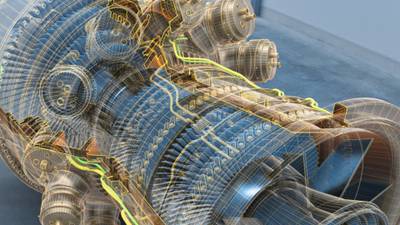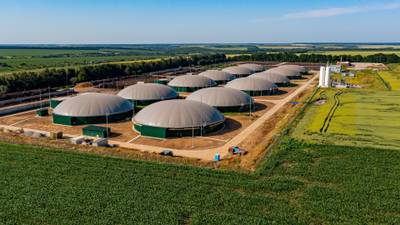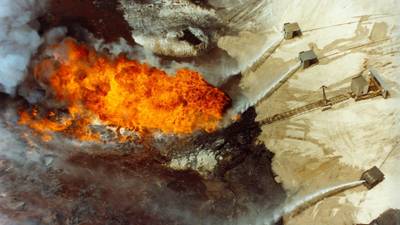Earn your Masters in Subsurface Energy Engineering, 100% online.
Develop the advanced skills in energy engineering, geo-energy resources and storage that you need to work with subsurface energy systems.
In this flexible online degree, you’ll cover the engineering processes and technologies used in subsurface energy projects, and learn to address the challenges related to the use and reuse of resources gathered from these environments.
You’ll access advanced training in the design and use of subsurface resources, in conjunction with low-carbon energy sources, to achieve a sustainable energy future.
With expert guidance from academics, engineers, and industry, you’ll cover:
- the fundamentals of fluid transport processes in subsurface media, with applications to Carbon Capture, Utilisation and Storage (CCUS), hydrogen storage, geothermal resources, and other low-carbon energy systems
- how to apply the latest computational and modelling techniques to analyse and evaluate the subsurface for energy-related purposes
- key techniques required for energy and material conservation, and
- management systems related to the environment, geo-energy, safety, and life-cycle assessment.
Prepare for careers in a range of sectors
You’ll graduate ready to work in the sustainable energy sector, but also in related areas including petroleum engineering, contaminant transport, geo-energy, and environmental engineering.
Interdisciplinary learning
In this interdisciplinary degree, you’ll take in aspects of chemical and petroleum engineering, geology, chemistry, and the economics of subsurface energy systems, giving you a broad overview of the industry.
A unique syllabus
Uniquely, you’ll also cover the important area of sustainable mining for critical energy transition metals, including copper, lithium and zinc, as well as the subsequent processing, recycling and reuse of these materials.
Exceptional expertise
This MSc builds on the University of Aberdeen’s long track record of teaching and research in energy. Your learning draws on much of the ground-breaking research being conducted within our Centre for Energy Transition (CET), in geothermal energy, CCUS, and materials critical for the energy transition.
Who can join this online MSc in Subsurface Energy Engineering?
This distance-learning degree is for people who want to work in subsurface energy generation and storage.
It’s ideally suited to:
- engineering or geology graduates who want to focus their careers on engineering aspects of subsurface energy systems and renewable energy generation, and
- existing experienced engineers looking to upskill or reskill for careers in the sustainable energy sector.
Choose the University of Aberdeen for MSc Subsurface Energy Engineering

Earn a respected Masters degree
You’ll earn the same globally recognised Masters degree online as you would on campus.

Train with energy transition experts
Learn with a university leading the way in renewables, carbon capture, fuel cells, digitalisation and more.

Over 525 years of excellence
You’ll graduate from the fifth-oldest university in the English-speaking world, founded in 1495.
By the end of this degree, you’ll be able to...
-
Demonstrate advanced knowledge of subsurface energy systems, including CO₂/hydrogen storage and geothermal resources.
-
Understand the principal theories of the flow of gases and liquids in subsurface, pipelines, and surface processes.
-
Analyse challenges related to energy storage and subsurface flow systems.
-
Design relevant processes for energy storage and subsurface flow systems.
-
Use life-cycle assessment and efficiency evaluation to analyse the sustainability of subsurface energy processes.
-
Apply a range of standards and specialised techniques to solve problems and design subsurface energy processes.
-
Implement creativity in solving engineering problems, alongside testing/de-risking and decision-making approaches.
-
Develop numerical models to simulate subsurface energy systems and analyse their performance.
-
Evaluate engineering problems related to subsurface energy systems and analyse solutions, taking into account economics and sustainability.
-
Communicate and use soft skills in delivering complex outcomes to a range of audiences through presentations and report writing.
What you’ll study
You can choose to study for a:
- Masters (180 credits)
- exit early with a Postgraduate Diploma (120 credits)
- exit early with a Postgraduate Certificate (60 credits), or
- start with one of the short courses that make up this degree (15 credits).
You can build your way to a qualification one short course at a time.
How you’ll study
Online learning
This distance-learning Masters in Subsurface Energy Engineering is delivered flexibly, 100% online.
You can learn with us anywhere, no student visa required, and manage your study hours to suit you.
Your teaching
Teaching is delivered through MyAberdeen, our online Virtual Learning Environment (VLE). It holds all the materials, tools and support you’ll need in your studies. Take a look around MyAberdeen.
You can access your learning materials on computer, smartphone and laptop, 24 hours a day. You’ll find a range of online resources available, including:
- recorded video lectures
- slide shows
- reading materials
- live online sessions
- discussion boards with your tutors and peers
- online access to our award-winning Sir Duncan Rice Library.
Live online sessions
Some of the courses that are part of this degree may feature some live online sessions to assist you with your learning. All live sessions will be recorded, so you can view these at your convenience if you are not able to attend live.
Your tutors
This online degree is delivered jointly by our School of Engineering and our School of Geosciences.
You’ll learn from highly research-active lecturers who, in partnership with industry, have designed this degree to ensure you study the latest technologies and thinking in the field.
Much of your syllabus is informed by research being carried out at our interdisciplinary Centre for Energy Transition.
This degree is assessed online.
We’ll use several types of online assessment throughout your studies, including:
- timed online exams
- written reports, and
- presentations.
Hours for taught courses
If you plan to study part-time, we recommend you take no more than 30 credits per term. Students typically take one or two 15-credit short courses per term.
15 credits
- Around 150 hours of study and assessment time to complete.
- You’ll study 10 – 15 hours per week per term, plus more at assessment times.
30 credits
- Around 300 hours of study and assessment time to complete.
- You’ll study 20 – 30 hours per week per term, plus more at assessment times.
This is an indicative guide to the time required for a typical student at this level to achieve the learning outcomes. This includes time for independent study, as well as teaching and assessments.
You can largely set your own study hours each week to cover the materials. MyAberdeen is available 24/7, so you can log in and study when it suits you.
Activities at fixed times
Some activities will be scheduled for fixed times, such as online meetings with your tutor or assessments with deadlines. But otherwise, you can access and work through each course at your convenience.
Hours for 60-credit projects and dissertations
A 60-credit project or dissertation is around 600 hours of study time.
This is around one term of full-time study.
You can dedicate a full term to your project or dissertation and work on it full-time. Or you can complete it part-time, spreading the hours you dedicate to it over two terms.
When you study with us, you can expect a first-class support structure so that you’re never alone in your studies.
But learning online does mean you have to motivate yourself and manage your own time.
Your most important commitment will be time – the time to work through, reflect on and understand your teaching materials.
Before you start a course that involves a high degree of independent study, we recommend looking at the time you will be able to devote to your studies each week:
- Be realistic
- Create a weekly schedule as a guide
If you have any questions about studying online, get in touch with our friendly team. We’re here to help.
Our first-class support structure will ensure that you aren’t alone in your studies. You’ll have contact with your tutors via MyAberdeen and email. You can use social media and discussion boards to chat with your fellow students too.
We provide a wide range of services to support you in your studies and beyond:
- Careers and Employability Service – including one-to-one advice sessions
- Disability support
- IT support
- Library support
- Student Support Service – help with finances, stress, wellbeing and non-academic issues
- Student Learning Service – study support, with advice sessions available via phone or Skype
- Aberdeen University Students’ Association (AUSA) – run by students for students
- Toolkit – clever apps and free training that can make your study life easier
Wherever you are in the world, you’ll feel part of our very special Aberdeen learning community.
We’re a member of the Access scheme run by the Society of College, National and University Libraries (SCONUL).
Access study spaces, books and journals in your area
The SCONUL Access scheme allows you, as a University of Aberdeen student, to access books and resources at university libraries across the UK and Ireland, or visit them for a quiet place to study.
You’ll be able to use study spaces, books and journals at over 150 university libraries which belong to the scheme.
Your support team
Our friendly team are here to answer any queries you have before, during and after your studies.

Dr Amin Sharifi
Amin is the degree coordinator. He’ll be on hand to answer questions about degree content before you start and to help you throughout your studies.

Lyn Magee
Lyn is part of the School’s administration team. She’ll be there throughout your studies to answer any of your non-academic queries.

Get in touch
The online education team is here to answer any questions you have right now about this qualification, or about studying online.
Ask us a questionWhere this will take you
Earn the same MSc qualification online as you would on campus
You’ll graduate with a respected MSc in Subsurface Energy Engineering from the University of Aberdeen, one of the UK’s six ancient universities.
You’ll receive exactly the same degree qualification online as you would on campus. Your degree title will not mention online or distance learning.
Your MSc qualification will be recognised by industry and educational institutions around the world, opening up international opportunities.
Careers in Subsurface Energy
You’ll graduate from this MSc ready to work in various areas related to energy extraction and storage, including:
- hydrogen transportation and storage
- the geothermal industry
- carbon capture and storage
- geo-energy engineering
- nuclear waste storage, and
- critical materials for the energy transition.
Transferable skills
The skills-based approach of this degree means you’ll also develop transferable skills for complementary roles within:
- the wider energy sector
- the oil and gas industry
- data analytics and policy
- government agencies and regulating bodies
- non-government organisations (NGOs), and
- academia.
Subsurface energy industry growth
The UK government’s Energy White Paper states that 220,000 positions will be required to support the energy transition in the UK alone over the next 10 years.
Carbon capture and storage (CCS) has been recognised as a critical technology by the UK government and is central to its Net Zero Strategy.
According to a report by Offshore Energies UK (OEUK), the UK has an estimated total carbon storage capacity of 78 gigatons, one of the largest in Europe and enough to hold two centuries’ worth of the UK’s current emissions.
The same report states that CCS could be worth £20bn to the offshore oil and gas supply chain in the next 10 years, and £100bn by 2050.
The growth of clean energy technologies is also creating a rapidly increasing demand for critical minerals, including copper, silicon, zinc, manganese, and rare earth minerals, with subsurface engineering skills required to harness these.

Lifelong career support
Our career support doesn’t stop when you graduate.
You have access to our free careers service while you study, and beyond.
- 1:1 appointments
- CV checks
- Interview prep
- Job opportunities
Fees and funding
The fee quoted above is based on you starting your studies with us in the 2024/25 academic year.
We have confirmed that our fees will rise by 5% for the 2025/26 academic year. Our indicative cost includes a 5% fee rise each year.
Pay as you go
This is a pay-as-you-go degree.
You do not have to pay the full tuition fee upfront.
You can spread the cost and pay as you go, term by term.
How it works
- You decide how many credits to study for each term.
- At the start of term, you pay only for the credits you’re taking that term.
- This gives you control over your costs and workload for each term of your degree.
Learning resources
Access to all the books and resources you need are included in your tuition fee. They’ll be made available to you online and you do not have to buy your own copies.
Printing
You may wish to set aside a small budget for printing, depending on how you like to work.
There are several ways you may be able to get help funding your studies:
- Employer sponsorship – we accept full and partial fee payments from sponsors
- Student loans
- Scholarships – search our funding database for scholarships
Find out more about funding options.
Student card
All our students are entitled to a University of Aberdeen student card. This gives you access to a range of student discounts around the city and online.
20% Alumni discount
You’re entitled to 20% off our postgraduate taught degrees and short courses if you have a degree from the University of Aberdeen. View Alumni discount details.
How discounts work
Discounts are applied during your application process. You can only use one discount per application.
Choose the University of Aberdeen for flexible online engineering degrees

Earn as you learn
We fit around full-time work, so you can earn qualifications while you keep earning a salary.

20% alumni discount
University of Aberdeen alumni receive 20% off fees for this online degree.

You’re in expert hands
We’ve been training world-class engineers for over 100 years and delivering online learning for decades.
Entry requirements
MSc, PgDip, PgCert
- A 2:1 UK honours degree (or equivalent) in any branch of Engineering, Applied Mathematics, Physics, or Geosciences.
You can also apply if you have:
- a 2:2 UK honours degree (or equivalent) in Engineering and three years of relevant industry experience.
Entry requirements
We welcome students from all over the world.
See the minimum entry requirements above. If you do not have qualifications from the UK, check equivalent qualifications from your country.
Visa requirements
You do not need a student visa to study online with us.
English language requirements
Teaching is delivered in English.
If English is not your first language, use our English requirements checklist to see if you need to provide evidence of your English language skills when you apply.
English language tests and scores
If you do need to provide English language test scores, these are the tests and minimum scores we accept for this course or degree.
These are our Postgraduate Standard requirements.
IELTS Academic, IELTS UKVI Academic, and IELTS Online (not IELTS Indicator or IELTS General Training)
- 6.5 overall
- 5.5 for listening, reading and speaking
- 6.0 for writing
TOEFL iBT and TOEFL iBT Home Edition
- 90 overall
- 17 for listening
- 18 for reading
- 20 for speaking
- 21 for writing
- TOEFL DI code is 0818
Cambridge English: B2 First, C1 Advanced, or C2 Proficiency
- 176 overall
- 162 for listening, reading and speaking
- 169 for writing
LanguageCert Academic/LanguageCert Academic SELT
- 70 overall
- 60 for listening, reading and speaking
- 65 for writing
LanguageCert International ESOL B2 Communicator (Written and Spoken) – Online / In-centre
- Overall High Pass
- 33 for listening, reading and speaking
- 38 for writing
Oxford ELLT Digital – English Language Level Test Online
- 7.0 overall
- 5.0 for listening, reading and speaking
- 6.0 for writing
PTE Academic (online test not accepted)
- 62 overall
- 59 for listening, reading, speaking and writing
Duolingo – tests taken from 1 July 2024 onward
- 120 overall
- 95 for listening, reading and speaking
- 105 for writing
University of Aberdeen English Pre-sessional Programme (PSE)
- Pass
- Valid for one year. Refresher can be offered if out of date
Pre-sessional academic English preparation programmes undertaken at other UK universities
- Pass at an equivalent of 6.5 (C1)
- B2 in all four skills
- Certification must be within one year prior to the start of your course
For full information about language requirements, see our English Language Requirements page.
You apply through our online Applicant Portal. It allows you to upload relevant qualifications and documents.
There is no application fee for our online degrees.
What you need to apply for this degree
- Degree transcript
- Personal statement
Apply now
Start with our step-by-step guide. It explains degree transcripts, what to write in your personal statement and how to use our Applicant Portal.
You can apply to start in either September or January.
Apply as early as you can. This is so we have time to review your application and get a decision to you. We also want to ensure you have time to enrol before teaching starts.
September 2024 intake
For our September 2024 intake, the application deadline is 8 September 2024.
You will need to accept your offer and provide any outstanding documents to meet the conditions of your offer by 15 September 2024.
Teaching starts on 23 September 2024.
January 2025 intake
Teaching starts on 27 January 2025.
Application deadlines will be announced in due course.
You will need access to:
A computer (PC, laptop or Mac) operating on either:
- Windows 10 or later
- macOS 10.15 (Catalina) or later.
Most teaching materials are smartphone- and tablet-friendly. But we recommend a proper laptop or desktop for completing assignments comfortably.
Reliable internet access
We recommend:
- a wired connection
- a minimum download speed of 2 Mbps so you can take part fully in live sessions.
Speakers or headphones
- We recommend a headset with built-in microphone and earphones if you’re likely to study in an environment with background noise.
- A webcam is optional, but you may like to use one for some interactive sessions.
Software
We’ll give you access to Office365 applications. This means you can use online versions of Microsoft Word, Excel, and PowerPoint and install these programs on up to five personal devices.
If your course requires specialist software, we’ll provide you with access to this and a licence that lasts throughout your studies.
See our detailed IT requirements for more information.
Master of Science
180 credits
£14,290
This indicative cost is based on 180 credits of study over three years, starting in September 2024.
Apply for this programme
- Start month
- September or January
- INDICATIVE COST
- £14,290
This indicative cost is based on 180 credits of study over three years, starting in September 2024.
Apply via our Applicant Portal

















